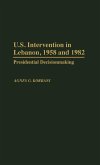Since the creation of Israel, during both wartime and peacetime, many Arab coalitions have formed. Every one of these anti-Israel coalitions has failed to achieve its goals due to the defection of one or more major parties. Kober explores the forces behind the dissemination of these alliances to determine why Arab states chose defection; whether or not a distinction can be made between defection patterns in times of war and patterns related to peace processes; and possible explanations for different behavior patterns. The multi-polar structure of the Arab subsystem, the decisions of pivotal members, and the negative reputations earned by such coalitions have always made defection an easy alternative. The choice to defect was, Kober contends, nurtured by a sense of military weakness and by the priority that coalition members attached to their particular interests over general Arab concerns. Kober finds that defection in time of war has arisen mainly through evasion-passive avoidance of coalition obligations with the hope of escaping or minimizing expected losses. Defection from military coalitions often deprived the defector of maximizing gains, all the while weakening the remaining coalition members. However, defection during the peace process served not only to optimize the defector's utilities, but eventually proved beneficial for the parties left behind. Kober determines that the peace process, mainly due to superpower involvement, transformed the scenario from a zero-sum to a non-zero-sum game, by rewarding the parties for signing treaties with Israel. Also, the first defectors, such as Egypt, established pay-off precedents, creating the foundation for future negotiations between the Arab players and Israel.
Hinweis: Dieser Artikel kann nur an eine deutsche Lieferadresse ausgeliefert werden.
Hinweis: Dieser Artikel kann nur an eine deutsche Lieferadresse ausgeliefert werden.








